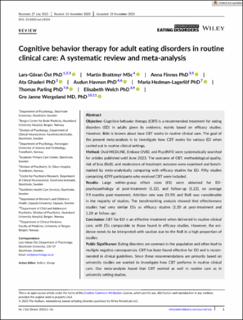| dc.contributor.author | Öst, Lars Gøran | |
| dc.contributor.author | Brattmyr, Lars Martin | |
| dc.contributor.author | Finnes, Anna | |
| dc.contributor.author | Ghaderi, Ata | |
| dc.contributor.author | Havnen, Audun | |
| dc.contributor.author | Hedman-Lagerlöf, Maria | |
| dc.contributor.author | Parling, Thomas | |
| dc.contributor.author | Welch, Elisabeth | |
| dc.contributor.author | Wergeland, Gro Janne Henningsen | |
| dc.date.accessioned | 2024-03-11T12:02:38Z | |
| dc.date.available | 2024-03-11T12:02:38Z | |
| dc.date.created | 2024-01-02T12:16:52Z | |
| dc.date.issued | 2023 | |
| dc.identifier.issn | 0276-3478 | |
| dc.identifier.uri | https://hdl.handle.net/11250/3121790 | |
| dc.description.abstract | Objective
Cognitive behavior therapy (CBT) is a recommended treatment for eating disorders (ED) in adults given its evidence, mainly based on efficacy studies. However, little is known about how CBT works in routine clinical care. The goal of the present meta-analysis is to investigate how CBT works for various ED when carried out in routine clinical settings.
Method
Ovid MEDLINE, Embase OVID, and PsycINFO were systematically searched for articles published until June 2023. The outcome of CBT, methodological quality, risk of bias (RoB), and moderators of treatment outcome were examined and benchmarked by meta-analytically comparing with efficacy studies for ED. Fifty studies comprising 4299 participants who received CBT were included.
Results
Large within-group effect sizes (ES) were obtained for ED-psychopathology at post-treatment (1.12), and follow-up (1.22), on average 9.9 months post-treatment. Attrition rate was 25.5% and RoB was considerable in the majority of studies. The benchmarking analysis showed that effectiveness studies had very similar ESs as efficacy studies (1.20 at post-treatment and 1.28 at follow-up).
Conclusion
CBT for ED is an effective treatment when delivered in routine clinical care, with ESs comparable to those found in efficacy studies. However, the evidence needs to be interpreted with caution due to the RoB in a high proportion of studies.
Public Significance
Eating disorders are common in the population and often lead to multiple negative consequences. CBT has been found effective for ED and is recommended in clinical guidelines. Since these recommendations are primarily based on university studies we wanted to investigate how CBT performs in routine clinical care. Our meta-analysis found that CBT worked as well in routine care as in university setting studies. | en_US |
| dc.language.iso | eng | en_US |
| dc.publisher | Wiley | en_US |
| dc.rights | Navngivelse 4.0 Internasjonal | * |
| dc.rights.uri | http://creativecommons.org/licenses/by/4.0/deed.no | * |
| dc.title | Cognitive behavior therapy for adult eating disorders in routine clinical care: A systematic review and meta-analysis | en_US |
| dc.type | Journal article | en_US |
| dc.type | Peer reviewed | en_US |
| dc.description.version | publishedVersion | en_US |
| dc.rights.holder | Copyright 2023 The Author(s) | en_US |
| cristin.ispublished | true | |
| cristin.fulltext | original | |
| cristin.qualitycode | 2 | |
| dc.identifier.doi | 10.1002/eat.24104 | |
| dc.identifier.cristin | 2218846 | |
| dc.source.journal | International Journal of Eating Disorders | en_US |
| dc.source.pagenumber | 249-264 | en_US |
| dc.identifier.citation | International Journal of Eating Disorders. 2023, 57 (2), 249-264. | en_US |
| dc.source.volume | 57 | en_US |
| dc.source.issue | 2 | en_US |

